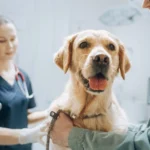Can Dogs Get Colds? What Pet Owners Need to Know
When the sniffles hit your household, you might wonder: Can Dogs Get Colds just like we do? As pet parents, it’s natural to worry when our furry companions start sneezing or acting under the weather. While dogs don’t catch the exact same viruses as humans, they can still experience cold-like symptoms that deserve attention.
Let’s explore what you need to know about dog colds, including how to recognize the signs, how to care for your pup, and how to keep them healthy all year round.

Content
Can Dogs Get Colds From Humans?
The short answer is no—dogs cannot catch the common cold or flu viruses that affect humans. So if you’re curled up on the couch with tissues and tea, your dog is safe from your germs. However, dogs can develop respiratory infections caused by viruses or bacteria specific to canines.
That said, dogs may show symptoms that resemble a human cold, such as sneezing, coughing, and a runny nose. These usually point to a mild upper respiratory issue, but in some cases, they could indicate something more serious.
Can Dogs Get Colds?: Symptoms to Watch For
Just like us, dogs with a cold may seem more tired than usual or less interested in eating. But how do you know if it’s truly a cold or something else? Below are the most common Dog Cold Symptoms:
- Sneezing and coughing
- Nasal discharge or congestion
- Watery eyes
- Fatigue or lethargy
- Low-grade fever
- Decreased appetite
These symptoms typically clear up within a week. However, if they worsen or your dog appears in distress, it’s best to consult your veterinarian.
Can Dogs Get Colds and Sneezing or Runny Nose?
Can Dogs Get Colds And Sneezing? Yes— it is a common concern. Sneezing and a runny nose are classic signs of a dog cold. Clear or slightly cloudy nasal discharge and occasional sneezing are generally not serious and often resolve with rest.
However, if the discharge becomes thick, yellow, or green, it may be a sign of a bacterial infection that needs medical attention. Likewise, if sneezing escalates into a cough or difficulty breathing, don’t wait—call your vet.
Can Dogs Get Colds And Runny Nose symptoms can also be confused with seasonal allergies or environmental irritants, so consider recent changes in your dog’s environment.
Dog Cold vs Kennel Cough
One common confusion is telling the difference between a cold and Kennel Cough, a contagious respiratory illness in dogs. Here’s how to compare them:
| Symptom | Dog Cold | Kennel Cough |
|---|---|---|
| Cough | Mild or none | Harsh, dry, honking cough |
| Sneezing | Common | Less common |
| Nasal Discharge | Watery or clear | Possible thick discharge |
| Appetite Loss | Slight or none | Possible |
| Duration | 3–7 days | Up to 2 weeks or more |
If your dog has been around other dogs recently—such as in a kennel, grooming facility, or park—Kennel Cough Symptoms may be the cause. It’s best to get a diagnosis if the cough is persistent or worsening.
How to Treat a Dog with a Cold

For mild cases, you can provide comfort at home. Here’s How To Treat A Dog With A Cold safely:
- Keep your dog warm and indoors.
- Ensure they have access to clean water.
- Offer tasty, nutritious meals—adding broth can encourage eating.
- Use a humidifier to help with nasal congestion.
- Allow your dog to rest without stress or overstimulation.
Most dogs recover within a few days. If symptoms continue or worsen, visit your veterinarian for further evaluation.
How to Treat a Dog with a Cold Naturally
If you prefer holistic care, there are gentle, supportive options for How To Treat A Dog With A Cold Naturally:
- Bone broth: Nutritious and hydrating, it encourages eating and supports recovery.
- Steam therapy: Let your dog sit in a steamy bathroom for 10 minutes to ease congestion.
- Natural supplements: Vitamin C or E (with vet guidance) can boost the immune system.
- Raw honey: A teaspoon may soothe a mild cough (only for dogs over one year old).
Do not give your dog human medications unless instructed by your vet—many over-the-counter drugs are toxic to dogs.
How to Prevent Dog Colds in the Future
While you can’t guarantee your dog won’t catch a cold, there are ways to reduce their risk:
- Keep vaccinations up to date, especially for Bordetella (kennel cough).
- Avoid overcrowded spaces during outbreaks.
- Provide a high-quality, balanced diet to strengthen the immune system.
- Bathe and groom your dog regularly to remove allergens or irritants.
- Keep your dog dry and warm in cold weather.
Prevention goes hand in hand with overall wellness. A healthy immune system makes colds less frequent and less severe.
When to Call the Vet
Mild symptoms are usually nothing to worry about, but contact your vet if:
- Symptoms last more than 7 days
- The cough becomes severe or persistent
- Your dog refuses food or water
- Breathing becomes labored or wheezy
- Nasal discharge becomes thick, yellow, or bloody
Your veterinarian can help rule out more serious issues and provide any medications or care needed for recovery.
Final Thoughts
So, Can Dogs Get Colds? Not in the exact way humans do, but they can still suffer from mild respiratory infections that mimic cold-like symptoms. From sneezing to fatigue, most cases are short-lived and easy to manage at home.
Being able to tell the difference between a common cold and Dog Cold Vs Kennel Cough helps you take the right steps at the right time. Whether it’s offering extra snuggles, steam therapy, or contacting your vet—knowing how to respond makes all the difference.
Learn more about the energetic and intelligent Jack Russell Dog in our detailed breed guide.
FAQs
How do you know if a dog has got a cold?
Watch for signs like sneezing, runny nose, watery eyes, and mild coughing that indicate cold-like symptoms.
Will a dog’s cold go away on its own?
Yes, most mild dog colds resolve on their own within a week with rest and home care.
What can I give my dog for a cold?
Offer warm, nutritious food, fresh water, and use a humidifier—never give human cold medicine without a vet’s approval.
How do you tell if your dog is cold?
Shivering, curling up tightly, or seeking warm spots are common signs your dog may be feeling cold.

Jerry takes a deep dive into the aquatic world. He’s your go-to for setting up the ideal fish tank, with expert advice on water quality and fish care.












